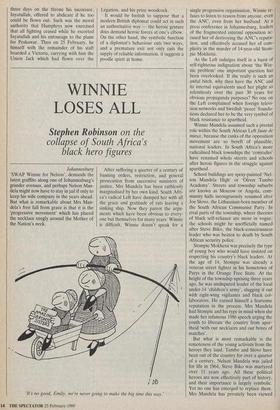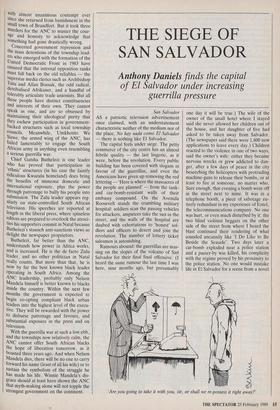WINNIE LOSES ALL
Stephen Robinson on the
collapse of South Africa's black hero figures
Johannesburg `SWAP Winnie for Nelson', demands the latest graffito along one of Johannesburg's grander avenues, and perhaps Nelson Man- dela might now have to stay in jail if only to keep his wife company in the years ahead. But what is remarkable about Mrs Man- dela's free fall from grace is that it is the `progressive movement' which has placed the necklace snugly around the Mother of the Nation's neck.
After suffering a quarter of a century of banning orders, restriction, and general persecution from successive ministers of justice, Mrs Mandela has been ruthlessly marginalised by her own kind. South Afri- ca's radical Left have dumped her with all the grace and gratitude of rats leaving a sinking ship. Now they parrot the argu- ments which have been obvious to every- one but themselves for many years: Winnie is difficult, Winnie doesn't speak for a
`It's no good, Emily, we're never going to make the big time this way.'
single progressive organisation, Winnie re- fuses to listen to reason from anyone, even the ANC, even from her husband. At a press conference in Johannesburg, leaders of the fragmented internal opposition ac- cused her of destroying the ANC's reputa- tion, and effectively accused her of com- plicity in the murder of 14-year-old Stom- pie Mokhetsi,
As the Left indulges itself in a burst of self-righteous indignation about 'the Win- nie problem' one important question has been overlooked. If she really is such an awful bitch, why then have the ANC and its internal equivalents used her plight so relentlessly over the past 30 years for obvious propaganda purposes? No one on the Left complained when foreign televi- sion networks and Swedish 'peace' founda- tions declared her to be the very symbol of black resistance to apartheid.
Winnie Mandela assumed such a pivotal role within the South African Left faute de mieux, because the ranks of the opposition movement are so bereft of plausible, national leaders. In South Africa's more radicalised black townships the 'comrades' have renamed whole streets and schools after heroic figures in the struggle against apartheid.
School buildings are spray-painted 'Nel- son Mandela High' or 'Oliver Tambo Academy'. Streets and township suburbs are known as Moscow or Angola, com- munity halls incongruously renamed after Joe Slovo, the Lithuanian-born member of the South African Communist Party. In rival parts of the township, where theories of black self-reliance are more in vogue, the schools might be unofficially named after Steve Biko, the black-consciousness leader who was beaten to death by South African security police.
Stompie Mokhetsi was precisely the type of young boy who would have insisted on respecting his country's black leaders. At the age of 14, Stompie was already a veteran street fighter in his hometown of Parys in the Orange Free State. At the height of the township uprising three years ago, he was undisputed leader of the local under-14 'children's army', slugging it out with right-wing vigilantes and black col- laborators. He earned himself a fearsome reputation in the process. Mrs Mandela had Stompie and his type in mind when she made her infamous 1986 speech urging the youth to liberate the country from apar- theid 'with our necklaces and our boxes of matches'.
But what is most remarkable is the remoteness of the young activists from the heroes they laud. Tambo and Slovo have been out of the country for over a quarter of a century, Nelson Mandela was jailed for life in 1964, Steve Biko was martyred over 11 years ago. All these political heroes are now effectively part of history, and their importance is largely symbolic. Yet no one has emerged to replace them. Mrs Mandela has privately been viewed with almost unanimous contempt ever since she returned from banishment in the small town of Brandfort. But it took three murders for the ANC to muster the cour- age and honesty to acknowledge that something had gone drastically wrong. Concerted government repression and the mass detentions of the township lead- ers who emerged with the formation of the United Democratic Front in 1983 have ensured that the internal opposition ranks must fall back on the old reliables — the superstar media clerics such as Archbishop Tutu and Allan Boesak, the odd radical, detribalised Afrikaner, and a handful of tolerably articulate trade unionists. But all these people have distinct constituencies and interests of their own. They cannot speak as one, and are so obsessed by maintaining their ideological purity that they eschew participation in government- backed structures such as local township councils. Meanwhile, Umkhonto We Sizwe, the armed wing of the ANC, has failed lamentably to engage the South African army in anything even resembling a serious guerrilla war.
Chief Gatsha Buthelezi is one leader who has proved that participation in ethnic' structures (in his case the faintly ridiculous Kwazulu homeland) does bring the benefits of immense domestic and international exposure, plus the power through patronage to bully his people into submission. The Zulu leader appears reg- ularly on state-controlled South African television. His speeches are reported at length in the liberal press, where spineless editors are prepared to overlook the atroci- ties his supporters commit in Natal because Buthelezi's staunch anti-sanctions views so delight the newspaper proprietors.
Buthelezi, far better than the ANC, understands how power in Africa works, and is increased. He is the de facto Zulu leader, and no other politician in Natal really counts. But more than that, he is now by far the best known black leader operating in South Africa. Among the ANC leadership, probably only Nelson Mandela himself is better known to blacks Inside the country. Within the next few months the government is expected to begin co-opting compliant black urban leaders into the highest level of the execu- tive. They will be rewarded with the power to disburse patronage and favours, and substantial exposure in the press and on television.
With the guerrilla war at such a low ebb, and the townships now relatively calm, the ANC cannot offer South African blacks the hope of liberation tomorrow, as it boasted three years ago. And when Nelson Mandela dies, there will be no one to carry forward his name (least of all his wife) or to sustain the symbolism of the struggle he has made his life. Winnie Mandela's dis- grace should at least have shown the ANC that myth-making alone will not topple the strongest government on the continent.

















































 Previous page
Previous page